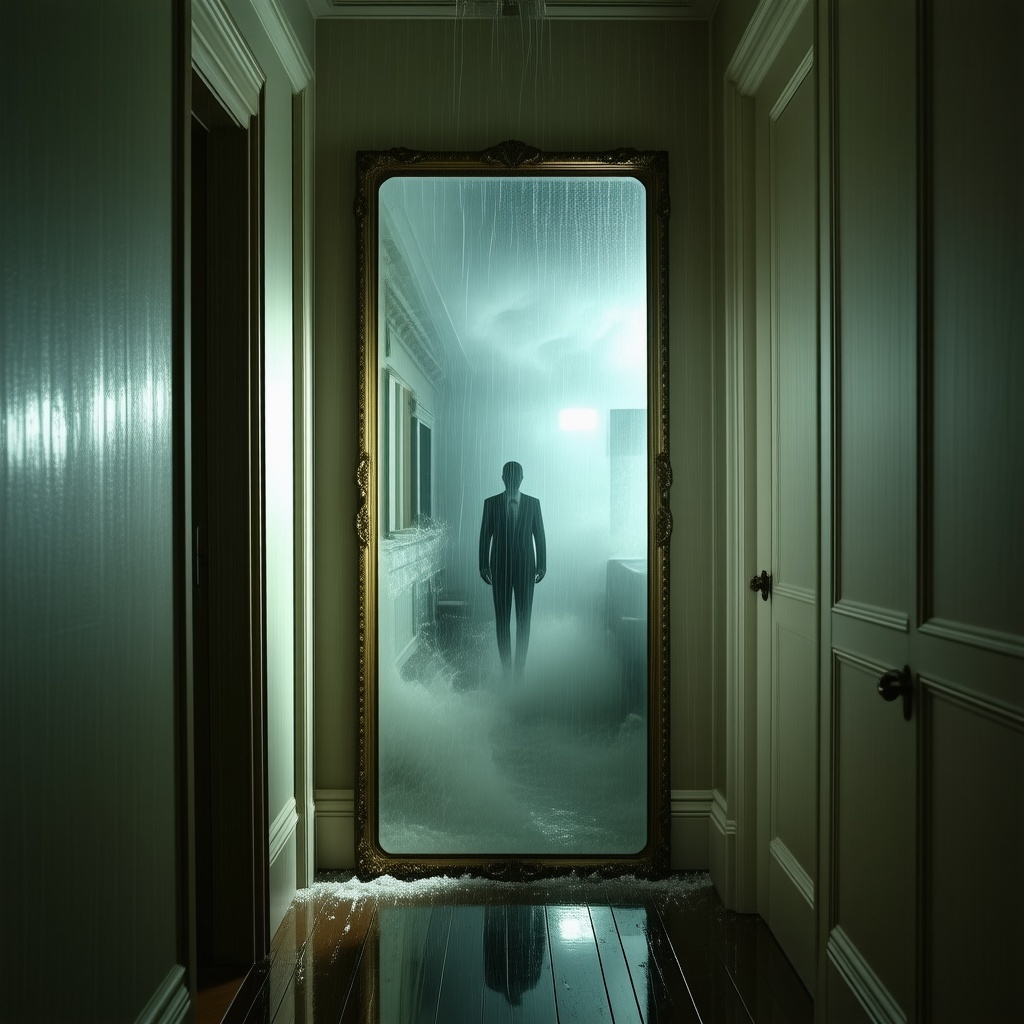Everyone in the village of Samrala knew the rule.
“Do not speak to the mirror after midnight.”
It wasn’t a superstition—it was a survival instinct. You didn’t question it. You followed it, the way you closed windows in a storm or locked your doors at night. It was never explained directly. The elders would grow silent when asked. The bravest men would avert their eyes from the mirror in Aarav’s ancestral home, especially after sunset.
Aarav had heard the stories since childhood. But now, at seventeen, freshly armed with logic and skepticism from school, he dismissed them all.
“You people are scared of your own shadows,” he muttered to his cousin Rinku one afternoon, “Mirrors don’t talk. Ghosts don’t exist. This is 2025.”
“You’re not listening,” Rinku said, voice low. “This isn’t just a tale. You know about Chacha Nandlal, right?”
“He disappeared during the war, right?”
Rinku shook his head. “He disappeared after whispering to the mirror. And he wasn’t the only one.”
Aarav smirked. “Cool story. Let’s test it.”
Rinku grabbed his arm. “You’ll regret it.”
But Aarav had already made up his mind.
That night, the storm came like a curse. Lightning forked across the sky. The ancestral home creaked as if it too was afraid. The air felt strange, like something watching.
At 11:55 PM, Aarav placed his phone on a tripod facing the tall mirror in the hallway. It was over six feet tall, brass-framed, and slightly misted from years of breath and silence.
“I’m recording this,” he said. “For evidence. This is going to be hilarious.”
At 11:59, he stood before the mirror.
The reflection stared back. He tilted his head. So did the image. He blinked. It blinked. Everything normal.
Then, the clock struck midnight.
The second it did, the house fell dead silent.
He leaned closer. “Hello?”
No response.
He chuckled. “Come on. Anyone in there? Spirit of the haunted mirror? Scare me already.”
Suddenly, the candle beside him flickered violently. The mirror rippled—not like glass but like the surface of water.
He froze.
His reflection began to… delay.
When he turned his head, it turned a second later. When he stepped back, it remained still. And then—it smiled. Not a nervous smile like his. A cruel, knowing grin.
His breath caught.
Then, the reflection stepped forward.
Aarav stumbled back as a foot broke the plane of the mirror—then a hand. Then the whole figure emerged. It was him—but not. The eyes were darker. The skin pale, veined. The voice… familiar but twisted.
“You called,” it said.
Aarav backed up. “What are you?”
“I’m you. The version you never let out. The one they buried with rules.”
“You’re not real.”
“But I am now. You opened the door.”
“I didn’t mean to.”
“Intent doesn’t matter. Action does.”
It lunged forward. Aarav screamed and bolted up the stairs, slammed his room door shut, locked it, shoved the study table against it, and pulled out his phone. No network.
Footsteps echoed closer.
A knock.
“Aarav,” the voice cooed. “Let’s trade places. You’ve had your turn.”
“No!” he cried.
The knocking turned to pounding. Then… silence.
He sat there, heart racing, till sunlight bled through the cracks.
When he opened the door, the hallway was empty.
Downstairs, the mirror stood cold, blank, and black.
No reflection.
That was a year ago.
Now “Aarav” is the pride of the village. He wins every exam. Helps old women cross the road. Volunteers at the temple. Never loses his temper.
Too perfect.
But no one sees him after dark.
And no one sees his reflection.
Rinku noticed it first. At dinner, when “Aarav” passed by the glass cupboard, there was nothing there.
Then strange things started happening. His dog barked at him. The birds fell silent when he passed. He would hum unfamiliar songs and speak in voices just slightly different.
And the mirror?
Still empty.
But sometimes, in the dead of night, if you walk past the hallway—very quietly—you’ll hear someone banging on the other side. Screaming. Pleading.
The real Aarav is still in there.
Alive.
Trapped.
Watching.
Waiting.
For someone else to break the one unbreakable rule.
Moral:
Some rules are not made to enslave you. They’re made to protect you—from what you’d let in… if you dared to open the door.
Some rules are not made to enslave you. They’re made to protect you—from what you’d let in… if you dared to open the door.
Some rules are not made to enslave you. They’re made to protect you—from what you’d let in… if you dared to open the door.
Some rules are not made to enslave you. They’re made to protect you—from what you’d let in… if you dared to open the door.
Some rules are not made to enslave you. They’re made to protect you—from what you’d let in… if you dared to open the door.
Some rules are not made to enslave you. They’re made to protect you—from what you’d let in… if you dared to open the door.
Some rules are not made to enslave you. They’re made to protect you—from what you’d let in… if you dared to open the door.
Some rules are not made to enslave you. They’re made to protect you—from what you’d let in… if you dared to open the door.



 React
React
 React
React